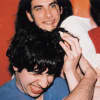Depending on who you are, maybe you know Black Dice as that super weird band that opens up for Animal Collective sometimes. Maybe you remember them from their noisier, more organic roots, or maybe you've obsessively been tracking their career nonstop since they started. The general consensus among a lot of their fans, me included, is that Beaches and Canyons is their best record.
Listening to it now, it's not as difficult as it initially seemed. There's still harsh, grinding electronics that last a little longer than you imagine. "Things Will Never Be The Same" moves from calm digital waves to power electronics seamlessly. For every moment of bliss, there's a mirror of harsh noise, yelped vocals and panicked drumming. If you go to the Wikipedia page, there isn't much there beyond a tracklist and a fairly exhaustive list of all the equipment the band used to make the record. Beaches and Cayons came out in 2002, and by 2007's Load Blown, Black Dice were playing fairly large venues. It was bizarre and confusing. Every time I saw them it always seemed like half the audience was on acid. Half the audience probably was on acid.
Yesterday, Pitchfork published an article on The New Electronic Brooklyn Underground, written by Andy Beta. The article looked at a crop of new labels that specialized in rugged, often experimental techno that was being played at warehouses and bizarre venues (Yoga studios! A train yard! A boxcar! Just kidding, mostly.) scattered throughout Williamsburg. It's an exciting article that draws attention to a lot of new artists that deserve every bit of that attention.
In the beginning of the piece, Beta recounts attending a screening of Shut Up and Play the Hits, the documentary about LCD Soundsystem’s final show at Madison Square Garden. He brings along a younger electronic musician who isn't familiar with LCD's output. Watching the movie, Beta notices the other guy not being especially moved by the music. It's a passing of the torch moment—you could call it, I guess, a new generation of kids that aren't beholden to New York's last big wave of DFA Records-helmed electronic music. This is understandable, in a sense. If you're a kid lurking warehouses and listening to low fidelity YouTube rips of classic Detroit techno, James Murphy's big budget final show is probably pretty far from your mind. But the fact that the label released Beaches and Canyons alongside The Rapture and LCD Soundsystem says something about electronic music, the blurry borders of dance music, and New York as a whole. Talk to anyone who's lived here for a little while, and they'll probably lament the loss of grittiness that the city once had. Maybe it's not going away so much as just moving around.
Many of the labels that Beta outlines in his piece occupy that same nebulous space between dance music and pure noise, using steady drumkicks as an anchor for zonked out synth experiments or new age tones, or silk-smooth basslines or weeded out guitar jamming. It's all there and it all works. Pete Swanson, formerly of drone outfit Yellow Swans, has been recording incredible music under his own name that takes the more formless aspects of Beaches and Canyons, and shapes them into something danceable. Dan Lopatin as Oneohtrix Point Never, repurposes new age tones just as Black Dice did on "Endless Happiness." Nothing was off limits. Now, more than ever, this record feels like an important touchstone. The one album you'd expect to find on most electronic music fan's shelf.
There was a point—if I'm remembering correctly, somewhere around Black Dice's 2005 release Broken Ear Record—where there was a rumor that Timbaland had approached Black Dice to tell them that he loved their music. It became one of those warm music industry stories that both vehemently denied and fervently accepted the concept that Timbaland was mining New York noise records for inspiration. I hope I never find out the truth about it. It points to outsider art as deeply important. Something that is loved by few, but for few that love it, something to cherish and forever return to.
Whether or not the Timbaland story is true, it feels nice to know that, consciously or not, Beaches and Canyons, a record that is visceral, difficult, often blindingly pretty and then loud and occasionally annoying is still embedded so deep in our collective music consciousness. It's too weird to ever go fully mainstream, but it's too important to ignore.

